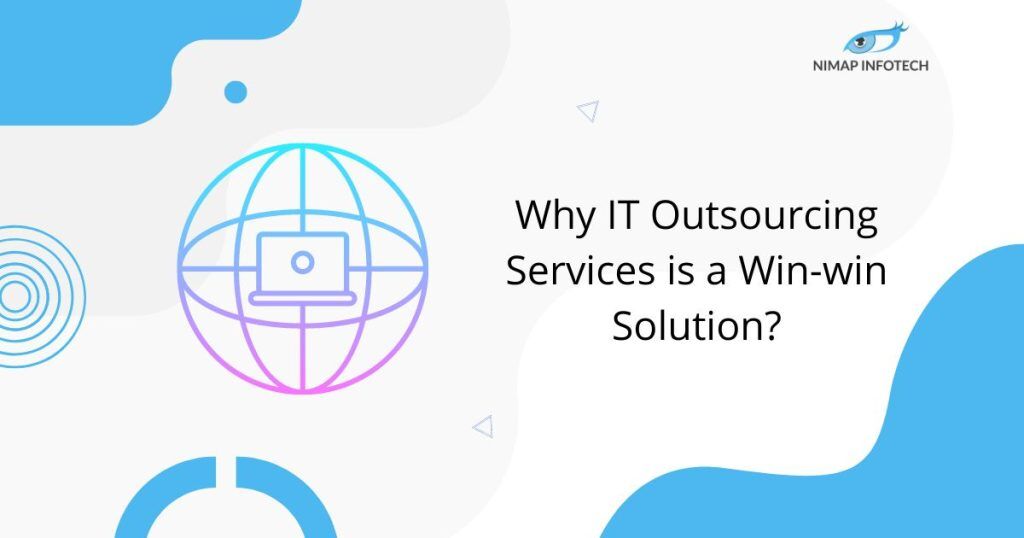Tech advances, improved communication tools, and more telecommuting foster global connections between consumers and remote workers, leading to increased external collaboration. Companies increasingly outsourced services to maximize global benefits. Driven by factors like a vast remote workforce, internet connectivity, superior talent, and cost-effectiveness, India’s outsourcing sector is poised to surpass its global counterparts.
Table of Contents
ToggleWhat is the True Meaning of “Outsourcing”?
Outsourcing is favoured by businesses as it safeguards their finances, resources, and development time. Offshoring ensures clients receive top-notch business services at reasonable costs.
Companies employ external assistance to provide diverse solutions and support across various sectors through subcontracting. These days, subcontracting is the preferred cost-cutting strategy for over half of businesses across all industries. These support teams enhance the customer experience.
India’s Outsourcing Sectors –
The offshoring market is expanding globally, providing companies with an opportunity to boost their brand value, generate revenue, and accelerate innovation. Over the years, India gained a reputation as the “global outsourcing hub” by creating an environment that makes it accessible to businesses seeking externalizing partners. Many other businesses have learned that India is their preferred location for outsourcing services after the IT and BPO sectors took the lead in recent years.
IT Sector:
Technology innovation and advancement in business are growing, and Indian IT outsourcing services help businesses obtain a competitive advantage.
IT services require the right tools and domain expertise. In the future, India’s top priorities for IT will be developing infrastructure and training employees.
The primary IT support services that every industry requires are:
- Software Development Services for Technical Support
- Development of mobile applications and websites
Many businesses outsource IT services to India due to its skilled software developers, future-ready infrastructure, and high-quality output.
BPO:
Virtual call centres, saving a substantial outsourced Indian workforce, enable agents to work from home with widespread high-speed internet.
The worldwide contracting sector has seen this phenomenon spread like wildfire. Once more, businesses are choosing to locate in India and the BPO sector there.
It will essentially stay the same because India has a history of adapting its business climate to evolving conditions.
The pandemic drove businesses to outsource processes to India, leveraging its unique communication and technology breakthroughs for BPO.
Knowledge Process Outsourcing (KPO):
KPO involves commercial operations involving information. Information processing is needed for several important functions, including:
- Study and Development for Financial and Investment Research
- Interpretation and Analysis of Data
Understanding the nature of business is necessary to carry out these sophisticated responsibilities. Processing vast amounts of data is also necessary.
The company employs individuals with advanced degrees and specialized knowledge. It is strongly advised that you outsource this as it will require significant resources and time.
Also Read: Top IT Outsourcing Trends that Will Rule in 2024
Why Do Businesses Require IT Outsourcing Services?
Outsourcing not only drives cost savings but also expands core skills and accesses fresh talent, despite the primary motive being cost savings.
Skilled Talent Pool:
- In today’s economic world, specialist talents are becoming increasingly necessary.
- Through outsourcing, businesses can access a worldwide talent pool and a variety of skill sets that might not be easily found in their local job markets.
- Outside service providers frequently bring specialized knowledge to the table, offering insightful knowledge and skills that help projects move forward more successfully.
Operational Flexibility:
- Outsourcing allows businesses with varying product demand to scale up or down in response to market conditions, which is a big benefit.
- When demand shifts, external service providers can scale up or down operations with ease.
- Without investing in long-term hiring, industries with seasonal fluctuations might use outsourcing to manage peak workloads during busy seasons.
Focus on Core Competencies:
- By assigning non-core or support tasks, like marketing, recruitment, etc., to specialized service providers, outsourcing enables businesses to focus on their core capabilities.
- Productivity, innovation, and general competitiveness all rise.
- Organizations can more effectively use their internal resources by outsourcing regular activities to outside service providers.
- This ensures the allocation of workers and resources to areas that ultimately strengthen the business.
Cost Savings:
- Cost savings are the biggest motive of outsourcing.
- External service providers give businesses the chance to drastically cut operating costs because they operate in areas with cheaper labour prices.
- By distributing the fixed expenses across several clients, outsourcing partners with specialized knowledge in software development services or call centres can get economies of scale.
What Does the Future Promise for the Outsourcing Sector?
The goal of many outsourcing firms is to provide more clients with better, more secure solutions. This presentation illustrates what the future of the outsourcing sector might look like.
Outsourcing High-end Processes:
- Companies that seek out externalizing solutions can now offer their partners greater stability and security. Their increased output of work gives them a competitive advantage.
- As businesses are starting to advance their work through externalizing and strategically planning the best solutions, staying ahead of the competition has never looked better.
Budget-friendly:
- The benefits of outsourcing on a business’s financial sheet demonstrate how beneficial it is for various types of enterprises.
- As business processes become more adaptable, outsourcing effectively reduces costs.
- With growing logistics and material costs worldwide, outsourcing has become a more sensible option.
Standardization Characterizes Outsourcing:
- These days, outsourcing is more defined and purposeful.
- Contracting out has led to a global market shift, focusing on people and processes.
- Outsourcing service providers offer significant benefits to businesses as they aid in strategic expansion.
- Nimap Infotech staffing services create additional space for collaboration between clients and remote teams.
- This standardized method enables proper oversight and eliminates the hassle of dealing with third-party communicators.
Resilience in Business:
- Nowadays, companies are focusing on externalizing sustainability to maintain long-term connections.
- Due to a lack of confidence and uncertainty, the pandemic forced companies to renounce their contracting out agreements with suppliers.
- To sustain and recover, organizations increasingly form strategic alliances with reliable offshoring providers for business support.
- Support and development will intensify as more companies turn to cloud contracting.
Read More: Promoting India IT Outsourcing to the World
The potential for contracting out is tremendous in the future. enterprises continue to adapt and expand through externalizing which benefits their enterprises, even as they grow in the face of hardship and diversity. It will save expenses, increase productivity, and give businesses trust for the future.
Author
-

Sagar Nagda is the Founder and Owner of Nimap Infotech, a leading IT outsourcing and project management company specializing in web and mobile app development. With an MBA from Bocconi University, Italy, and a Digital Marketing specialization from UCLA, Sagar blends business acumen with digital expertise. He has organically scaled Nimap Infotech, serving 500+ clients with over 1200 projects delivered.
View all posts








